Bernie’s out. I guess it’s no surprise. There really wasn’t a reasonable electoral path forward to the Democratic nomination after the crushing defeats on Super Tuesday and in subsequent contests in Michigan, etc. While there are still many voters yet to be heard from, the mainstream Democratic party has coalesced around their preferred standard-bearer, the somewhat limp-minded former vice president, whose halting commentaries from a foot or two in front of an IKEA backdrop are barely making a ripple, even in MSNBC land.
I almost never hear from Biden until his watery opinions are being criticized by left commentators. What the hell kind of communication shop are they running there? Is this a presidential campaign or a race for dog catcher? Just this past Tuesday, as Wisconsin voters were queuing up to vote in the midst of a pandemic, thanks to their state Republican party, the most Biden could manage to say about this disaster was that the science should decide whether or not it went forward. Really? Best you can do, Joe? What the fuck. Are you sure you want to be president?

It just never ceases to amaze me how dedicated the Democratic party can be to its own self-immolation. We had more than twenty people to choose from on that debate stage, and we went with the guy whose turn it was … the guy who the party felt was due a spot on the top of the ticket, just as Hillary was in 2016, regardless of his skills as a candidate, his mental acuity, his political baggage, etc. This outcome sets us up for a serious fight in November, and it’s not clear to me how we can possibly prevail, given the degree to which Trump and the Republicans are dedicated to gaming this election nine ways from Tuesday. Trump is already setting the predicate for claims of voter fraud, spouting BS about voting by mail. This, combined with the COVID-19 scare, will make it all the easier for the GOP to claim either victory or fraud, and who knows what consequences will proceed from that.
In any case, I want to acknowledge Bernie Sanders’ remarkable contribution to American politics over the past ten years in particular. Since he made that long speech on the Senate floor in the wake of the Occupy Wall Street movement, Bernie has brought progressive politics to the fore in a way that simply has no parallel in the modern history of this country. Across a broad range of issues he has staked out a distinctly leftist position in such a way as to pull the Democratic party in our direction and away from the neoliberal consensus that has ruled it for several decades. For that we owe him a debt of gratitude.
Regardless of who the Democratic presidential nominee is likely to be, Bernie has done a lot of the hard work of structural change since 2011. It is up to us to finish what he started.
luv u,
jp

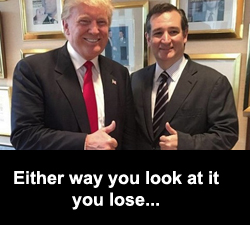 The most important component in the argument against “Bernie or Bust” is simply that we cannot afford eight years of one-party rule under the Republicans. This would have a hugely negative impact on the most vulnerable in our society, on the environment, on our brothers and sisters in other countries around the world, and more. The fate of the Supreme Court alone is enough reason to vote for the Democratic nominee, no matter who it is. Scalia’s replacement is only just the first slice; three or four more justices could step down in the coming years. If Donald Trump or Ted Cruz ends up being the person replacing them, say goodbye to any hope of social justice for decades to come. A Cruz court would make Roberts seem like Earl Warren.
The most important component in the argument against “Bernie or Bust” is simply that we cannot afford eight years of one-party rule under the Republicans. This would have a hugely negative impact on the most vulnerable in our society, on the environment, on our brothers and sisters in other countries around the world, and more. The fate of the Supreme Court alone is enough reason to vote for the Democratic nominee, no matter who it is. Scalia’s replacement is only just the first slice; three or four more justices could step down in the coming years. If Donald Trump or Ted Cruz ends up being the person replacing them, say goodbye to any hope of social justice for decades to come. A Cruz court would make Roberts seem like Earl Warren. What irks me, though, is the legitimization of truly extremist right-wing notions of governance (or lack of same) through what I’m sure NPR and other networks consider “balance coverage”. A brief example: yesterday there was a
What irks me, though, is the legitimization of truly extremist right-wing notions of governance (or lack of same) through what I’m sure NPR and other networks consider “balance coverage”. A brief example: yesterday there was a 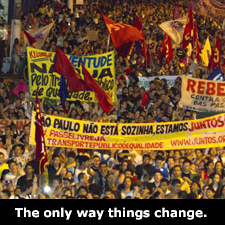 Still, it’s interesting that in both cases, the original impetus for the protest was a decision by the government affecting public services. Both Turkey and Brazil have been touted as relatively successful governments, and yet beneath many success stories there is often another story to tell, that of the poor, the working people, those left behind. You can see them in Brazil, in China, in India, in Turkey, just as you can see them here in the United States. True, the standard of living in Brazil has improved vastly over the last decade. But the people protesting increased transit fares are making us aware of the work that is yet to be done.
Still, it’s interesting that in both cases, the original impetus for the protest was a decision by the government affecting public services. Both Turkey and Brazil have been touted as relatively successful governments, and yet beneath many success stories there is often another story to tell, that of the poor, the working people, those left behind. You can see them in Brazil, in China, in India, in Turkey, just as you can see them here in the United States. True, the standard of living in Brazil has improved vastly over the last decade. But the people protesting increased transit fares are making us aware of the work that is yet to be done.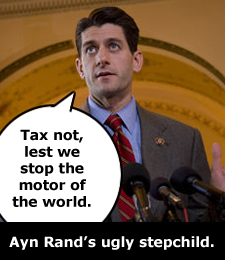 And contrary to what is argued by Ayn Rand acolytes like Paul Ryan and (Ayn) Rand Paul, the wealthy truly do ride on the backs of working people. That has always been the case. Rand imagined the world being brought to a standstill by a wealthy, innovative class of overlords who withhold their beneficent participation in Rand’s dystopian top-down economy. The truth is, they are far more reliant on us than we are on them. Sure, the wealthy can choose to invest their capital in ways that create jobs. But where did that capital come from? How does an industrialist, a banker, an entrepreneur, an oil executive gather all that wealth? Mostly through the under-compensated labor of millions of workers.
And contrary to what is argued by Ayn Rand acolytes like Paul Ryan and (Ayn) Rand Paul, the wealthy truly do ride on the backs of working people. That has always been the case. Rand imagined the world being brought to a standstill by a wealthy, innovative class of overlords who withhold their beneficent participation in Rand’s dystopian top-down economy. The truth is, they are far more reliant on us than we are on them. Sure, the wealthy can choose to invest their capital in ways that create jobs. But where did that capital come from? How does an industrialist, a banker, an entrepreneur, an oil executive gather all that wealth? Mostly through the under-compensated labor of millions of workers.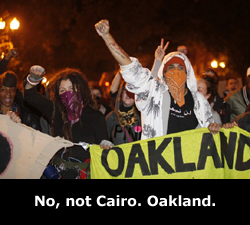 I think it’s worth remembering that in Egypt, in Tunisia, and likely elsewhere, it was economics that really lit the fire under people. Torture in police custody, exclusion from meaningful political participation, persecution of minorities … abuses of every kind and character were endured by Egyptians – not without resistance, mind you, but without broad outrage. It wasn’t until Mubarak instituted substantial neoliberal economic “reforms”, opening up the Egyptian economy to greater international corporate penetration, that people had had enough. Now not only did you lack a voice in government and enjoy no constitutional rights when detained; you also could not make even the meager living you were making a year or two before. In a nation of extreme economic inequality, this was more broadly felt even then the hard end of the police baton. Everyone was affected.
I think it’s worth remembering that in Egypt, in Tunisia, and likely elsewhere, it was economics that really lit the fire under people. Torture in police custody, exclusion from meaningful political participation, persecution of minorities … abuses of every kind and character were endured by Egyptians – not without resistance, mind you, but without broad outrage. It wasn’t until Mubarak instituted substantial neoliberal economic “reforms”, opening up the Egyptian economy to greater international corporate penetration, that people had had enough. Now not only did you lack a voice in government and enjoy no constitutional rights when detained; you also could not make even the meager living you were making a year or two before. In a nation of extreme economic inequality, this was more broadly felt even then the hard end of the police baton. Everyone was affected.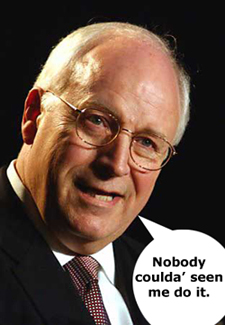 Well…. maybe we can. There seems to be an overwhelming desire to do so. Not surprising. We’ve seen the result of not holding people accountable. Cheney’s a good example – still on the loose, influencing policy in some fashion. Karl Rove is another one, out raising millions for another crop of right-wing nut jobs. If course, no one has been held to account for the Iraq War, a needless conflict that tore a swath of destruction through an entire nation as well as the military families in America, draining our treasury and putting us at greater risk of attack. Ask any conservative – if you fail to adequately punish lawbreakers, you encourage others to break the law. We have certainly emboldened future presidents to march into any country they care to invade. In fact, Obama already has, without much fanfare or protest.
Well…. maybe we can. There seems to be an overwhelming desire to do so. Not surprising. We’ve seen the result of not holding people accountable. Cheney’s a good example – still on the loose, influencing policy in some fashion. Karl Rove is another one, out raising millions for another crop of right-wing nut jobs. If course, no one has been held to account for the Iraq War, a needless conflict that tore a swath of destruction through an entire nation as well as the military families in America, draining our treasury and putting us at greater risk of attack. Ask any conservative – if you fail to adequately punish lawbreakers, you encourage others to break the law. We have certainly emboldened future presidents to march into any country they care to invade. In fact, Obama already has, without much fanfare or protest.